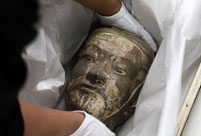BEIJING, May 10 -- Experts hailed the government's recently pledged unified real property registration policy, saying it will help fight corruption.
The central government established a government agency to supervise real property registration on Thursday as part of an effort to accelerate the registration process.
The bureau, under the Ministry of Land and Resources, will be in charge of the registration of land, real estate, forest, grassland and maritime space.
China plans to build a national real property registration system in about three years and make it operational for information sharing and queries in four years.
A senior official with the new government agency said that the unified registration system does not target the housing sector specifically and its primary purpose is not to tackle corruption or curb home prices.
But experts said unified registration will be a deterrent and will help uncover corrupt officials.
Zhou Keda, a researcher with the Guangxi Academy of Social Sciences, said that the system will help make data on officials' home ownership more transparent and lead to discovery of evidence in potential corruption cases.
Wang Yukai, a professor with the Chinese Academy of Governance, said the nationwide registration system and an online information sharing and query platform will help push forward the country's already high-profile anti-corruption campaign.
The latest policy will have little impact on average government workers, but will pose problems for high-level officials, said a low-level official in south China's Guangxi Zhuang Autonomous Region who declined to be named.
"Coping with the real estate information registration will be a headache for officials who have abused their power for personal gains and own multiple homes," the official said.
"From this point of view, the unified system could help uncover corruption and expose those who bought multiple houses with illegal earnings or who abused their power to acquire several government-funded low-cost apartments," he said.
In late 2012, an government official in Guangzhou's Panyu District was sacked after an online post alleged that he owned 22 houses, which was later confirmed by a government investigation.
The official was later charged with receiving bribes amounting to 2.75 million yuan (442,000 U.S. dollars) from 1993 to 2012.
However, others said the registration system might face challenges.
Last month, a media report said one million government workers in east China's Anhui Province had registered only 300,000 homes, sparking widespread debate.
The local government later issued a clarification on the statistics, but experts still believe it will not be easy to get accurate information.
Home ownership could change hands and data should be updated constantly, said Wang.
Xu Deming, former vice minister of land and resources, said in March that the property registration will not infringe on privacy by making data public arbitrarily.
Fang Ning, a researcher with the Chinese Academy of Social Sciences, said unified registration could help curb official corruption and build a clean government, but the public needs patience as no policy will have quick effects.
 A free sky for music
A free sky for music Terracotta Army to the US
Terracotta Army to the US When we are young...
When we are young... Solar halo occurs in Lhasa
Solar halo occurs in Lhasa Photos give cheongsam a new life
Photos give cheongsam a new life Graduates bid farewell to campus in clown costume
Graduates bid farewell to campus in clown costume Badain Jaran Desert: Amazing curves of nature
Badain Jaran Desert: Amazing curves of nature Beautiful Chinese-built roads in Africa
Beautiful Chinese-built roads in Africa High fashion trend welcomed by costumers in Changsha
High fashion trend welcomed by costumers in Changsha The 'Chinese Dad'
The 'Chinese Dad' Chinese mountaineer's gear list
Chinese mountaineer's gear list  Newly recruited police in Hetian hold drill
Newly recruited police in Hetian hold drill  China's most luminous celebrities
China's most luminous celebrities Top 10 most expensive cars in the world
Top 10 most expensive cars in the world 'African Street' in Guangzhou
'African Street' in GuangzhouDay|Week|Month